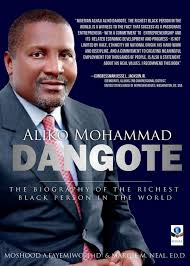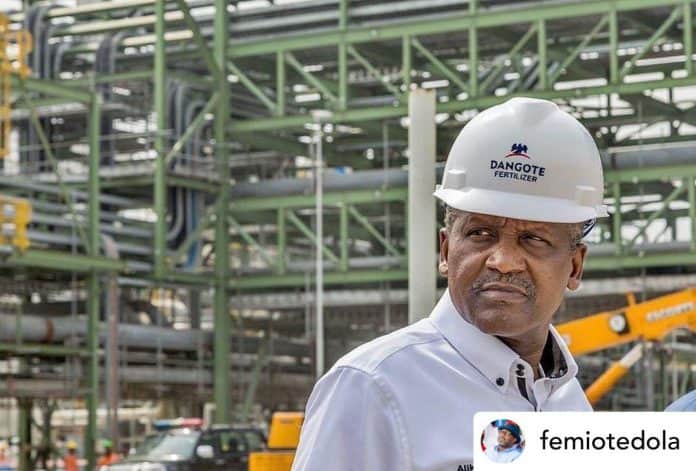Aliko Dangote, like most billionaires in Nigeria, lives his life on a very lowkey, making it hard to demystify the secrets to his success.
Yet as entrepreneurs, we know that every success story thrives on a set of principles.
Hence, we continue to scavenge like hungry hounds, following each trail of a success story to unravel its mysteries.
Here’s what entrepreneurs learn from Aliko Dangote?
His lifestyle, ethical values, prudence, simplicity, ability to spot talents, the fear of God and other similar characteristics of other billionaires of the world are not hereditary but distinctly Aliko
Excerpt from: “Aliko Mohammad Dangote: The Biography of the Richest Black Person in the World” by Moshood Fayemiwo. Scribd.
Mind you; this is not another inspire to perspire type of post.
Contents
What this Article Entails:
While you may be familiar with motivational talks that don’t tell you anything new, this detailed breakdown may lead you to break bad financial habits and challenge you to dare like Aliko Dangote.
When I wrote a post about the top 10 richest people in Nigeria, one of the things that caught my attention is that they are hardly open to interviews.
No, they’re not trying to sell you another get rich quick scheme which is fronted as a book on how to succeed or 20 things Rich and famous people do.
Before I go further, you might want to read the book; Aliko Dangote. It’s available on Amazon, or you can read it on Scribd.

“A highly recommended book to anyone who enjoys learning about how different people of all walks of life become rich and successful, and what it takes to get to the top” —Readers Favorite Book (Starred Review), USA. “A compelling book about a unique personality in Africa” —Goodreads, USA. GoodReads
There are no shortcuts to success, and while most of this post are lessons from the book Aliko Dangote, I’ll encourage you to read the book for yourself.
Did you know Dangote’s maternal grandfather Sanusi Dantata was a wealthy trader in Kano? He traded in rice and oats. Sanusi’s father and founder of the Dantata legacy – Alhassan Abdullahi Dantata was also a wealthy trader whose cooperation with the Lever Brothers (Now Unilever), saw the establishment of the British Bank of West Africa now First Bank. But the era of the groundnut pyramid brought great fortune to Alhassan Danta. And few people recall that Dangote’s father was at some time the richest man in Nigeria.
But not all the fortune of rich men can boast of such trans-generational impact.
About Aliko Dangote
Early life
Born to Mohammad Dangote and Mariya Dantata, Aliko Mohammed spent very little time with his biological parents. For a while, he had come to know his mother’s sister as his mother and his grandfather as a father.
The Dantata boys come from a linage of wealth and business legacy. Their avoidance in direct politics even up to their fourth and fifth generation sterns from an oath made to their father – Pa Alhassan Dantata. This promise was born from a terrible experience that led to the death of a family member who had at the time dabbled into politics.
It was this commitment to stay off politics that led to Aliko stay in the Danata house.
Mohammed Dangote at the time was a famed Politian, and when he showed interest in marrying Mariya Dantata, her father Sanusi Dantata instead that his daughter would remain I his house after marriage.
So it was in this house in Koki Quarters kano that Dangote was born. The patriarch of the Dantata house named him Aliko while he took hi other names from his father.
The death of Mohammad Dangote further solidified Aliko’s opinion on dabbling into politics.
However, he has had great influence on the government for sole reasons of preserving his business investment.
Aliko disclosed in his biography that the reason he would be interested in the political future of Nigeria: he does not want “bad” politicians to control power and enact antiinvestment policies that would make him poor. “I do not want Nigeria to be another Zimbabwe so I am concerned about the political direction of my country, because if bad and inexperienced politicians control power in Nigeria, my wealth may turn into poverty.
Failed Businesses
Although Dangote is famed for his business conquest and house hold name, so much so that he was nicknamed Risk and who dares win.
Dangote prides on risk. His matra is that avoidable risk is not a reciepe for success in business and in life.
But Dangote hasn’t always won especially in an unstable business environment like Nigeria.
In May 2007 umaru Musa Y’ar’Adua seized the two Nigerian-owned refineries in Kaduna and Port Harcourt that were earlier sold to aliko Dangote. Instead of being fazedout, Aliko set up to building his own refinery.
Speaking about the refinery sale in his biograbhy, he says:
“How much did the government spend in 1989 to build these refineries? Obviously there would be depreciation after these many years. Here is something that was run down. You don’t now go and recover your money. We paid the price of $1.1billion, because the $561million we paid for Port Harcourt is 51 percent of $1.1billion. We didn’t buy the whole refineries. The government still owns 49 percent. We only bought 51 percent. And 51 percent of $1.1billion is only $561million. That’s how we arrived (at) $561million. In the case of the Kaduna Refinery, the Chinese which Nigerians don’t mind, if it goes to a foreigner, the Chinese were given juicy oil blocks. The day that they signed the production sharing agreement that was the day that they said: “We are not bidding, unless we sign and collect the oil blocks.” These guys signed and collected the oil blocks and they still priced the refinery at $102million. And they vowed they would not pay more than $102million. Then we said, fine, rather than allowing this thing to decay like that, we wrote to say we were interested also in bidding. The price that they gave was far below the reserved price. And now, we gave 60 percent more than the Chinese. And the Chinese said they were not going to put a dime more than $102million.”
Mr. Dangote continued; “We bought at $160million with all the challenges. But I thought this same refinery was given to Shell, to Chevron, to Texaco and they rejected them, saying they don’t want to even run them for nothing. And we have now paid over ₦100billion and people are shouting. I believe people should focus more on shouting about Eleme Petrochemical. Government spent almost $1.5billion and it was sold for $200million. And we bid. And we lost. And people didn’t see that. We bid for the same Eleme Petrochemical with a company that has never ever visited Nigeria. But because they are foreigners, they bought not even 51 percent, they bought 75 percent. And they were hailed. And they paid. And they got it. We lost as Dangote. And we spent more than $5 to 7million doing things like bringing experts to come and check and (follow) due diligence and all that. We lost our money and time. But Nigerians didn’t say anything because these are foreigners. That is by the side.”
“Look at the way and manner foreigners bought Ajaokuta” referring to his nation’s largest steel complex located in central Nigeria. “Ajaokuta almost made Nigeria bankrupt. The government of Nigeria spent $4.4billion on Ajaokuta. And all these foreigners don’t bring their money in here. Majority of the money they borrowed locally. They didn’t bring fresh cash. And these same people paid a paltry $300million for 60 percent of a plant that government spent $4.4billion
Delta Steel, government spent $1.45billion, then renovated it with ₦45billion (about $42million) and they sold it for $30million to be paid over three years. This one was also sold to an Indian company. They don’t have anything in Nigeria, but people now are not complaining. I am not complaining about the price these things were sold. What I am complaining about is that if you have to complain; then complain about foreigners taking our assets.”
Similarly, he took swipes at the sale process of Nigeria’s aluminium smelting company that was sold to a Chinese company as well “At ALSCON the smelting company, government spent $3.4billion. The Russians that have never ever visited Nigeria bought the company at $200million, with the condition that it is after the government dredges the river they would pay the $200million. And the cost of dredging the river is $260million. So you can see that government had to give out $60million out of their pocket to get rid of ALSCON. Excerpt from: “Aliko Mohammad Dangote: The Biography of the Richest Black Person in the World” by Moshood Fayemiwo.
Also, in his bid to purchase the Sugar plant at Bacita, Dangote went as far as making a marriage proposal to Mrs Josephine Oluwadamilola Kuteyi. The relationship did not work out for religious reasons and in 2006, Mrs Kuteyi would go on to own the Sugar plant after making a 2.5 billion naira down payment.
Mrs kuteyi ran the sugar plant with her sons up till 2011 when she died in a plane crash, while flying from her sugar plant to her home town in Ondo, Nigeria.
Going Global
According to a confidential cable message quoted in dangote’s biography, In 2011, the United States Embassy in Nigeria sent another confidential cable message to the State Department in Washington DC about Mr. Aliko Dangote. “Alhaji Aliko Dangote (Dangote) is founder, president and CEO of Nigeria’s largest national company, Dangote Group of Companies (the Group).
Dangote’s wealth and prestige are based on his family connections and political friendships yet he is esteemed by many Nigerians for his business acumen.
He has led the Dangote Group of Companies to unprecedented success in Nigeria, starting the company as a trading entity in 1977 and growing it to an estimated $700 million manufacturing or semimanufacturing behemoth that it is today.” The cable continued: “The Group is a household name in Nigeria and comes closer than any Nigerian company to market domination in many sectors.
The Group employs roughly 10,000 Nigerians and turns over a profit estimated at $1.3 billion. It runs 15 manufacturing and bagging facilities nationwide and has operations in industries as wide ranging as cement, sugar, wheat, textiles, polypropylene sacks, and property leasing. Part of the Dangote business strategy is to focus on provision of basic human needs: food, shelter, and clothing.”
In a December 1996 interview, Aliko Dangote admitted that a government mandate once forced him to import so much rice that the local market crashed by almost 80 percent. The direction of Government of Nigeria trade barriers also suggests preferential treatment. High tariffs or outright bans on imported items favor the Group in nearly all areas in which they do business including wheat flour, cement, certain textiles, sugar and pasta.
Further, the Government of Nigeria is normally slow in privatizing stateowned production facilities.
Yet the Dangote Group swiftly won bids on Government of Nigeria-owned manufacturing installations such as the Benue Cement Company and the Savannah Sugar Company, and constructed its own berth at Government of Nigeria-owned Apapa port in Lagos where ships with production inputs offload directly at the Dangote Group factory.”
The highly-classified cable concluded that Mr. Dangote was not operating according to market forces but like an insidertrading environment in which the Nigerian Government was his agents, disclosing that Dangote’s obvious unfair advantage and support from the Government of Nigeria are disturbing for US companies wanting to enter a market with over 130 million consumers. Conversely, some US companies indirectly benefit from Government of Nigeria restrictions protecting the Dangote Group of Companies, adding complexity to the Dangote paradigm. For example, Dangote allegedly receives unfair, preferential treatment to import bulk commodities. However, he is a loyal U.S. wheat customer and buys millions of dollars worth of other US products. General Electric makes much of Dangote’s machinery and the Group will buy about 300 used trucks (mostly made by International) from the US this year. Further, the Group secured a USD 310,000 grant from the Trade Development Agency in 2000 and aspires to a future Export-Import Bank loan.” – Excerpt from: “Aliko Mohammad Dangote: The Biography of the Richest Black Person in the World” by Moshood Fayemiwo.
What Values Can Entrepreneurs Learn From Dangote?
As the wealthiest man in Africa, Aliko Dangote has stayed true to the business niche as opposed to ploughing the political ladder. Another thing Dangote has proven is that one can be a jack of all trade and still master all. He started in construction then diversified to manufacturing and later fast-moving consumer goods (FMCG). One thing is clear he is not afraid to challenge the status quo.
Beyond this, Aliko Dangote is a big fish that is impossible to hide.
Although we know of his heritage, there may be more to Aliko Dangote’s. His success sterns from his mastery of the rules of success.
Over the years, Dangote has learned to apply these rules to his business while maximizing the opportunities around him.
Lessons for entrepreneurs: LEARN TO MAXIMIZE OPPORTUNITIES.
The Laws of Success
Recognize God’s Guidance and blessing:
Aliko’s most outstanding value is his faith in God. Like most rich people, Aliko always credits his success to God. He recognizes that his efforts may quickly work against him but for the mercies of God.
It’s amazing how people continue to make a mockery of religious organizations, yet the wealthy people continue to give their support to religious organizations. And these are not just by Nigerian standards only.
Dangote believes that one can go from the very top to the very bottom, and with the help of God, such a person will not find it difficult to adjust.
Like Rocke-Feller, Dangote belives that “the power to make money is a gift from God”.
The Law of Discernment
The law of discernment also refers to current information. Remember that one of the secrets of Dangote’s success was staying ahead of his competition. This comes through knowledge of the happenings around us.
As an entrepreneur, it is dangerous to lack discernment.
Aliko’s timely move from Kano to Lagos having discerned the capacity of the purchasing power of the residents in Lagos.
Success is 90% per cent guts and 10% capital. – Raymond Akerman.
Lessons for entrepreneurs: TAKE BOLD AND CALCULATED STEPS BY LEARNING TO READ EVENTS AND TRENDS INSTEAD OF WAITING FOR TIME
The Desire to Create a Need or a Service
Aliko, like other successful people in business, does not have money as their primary focus. Aliko understands the power of why.
His business decisions are inspired by the need for countries to look inward toward private entrepreneurship.
Little wonder why he consistently recognizes the opportunities within the manufacturing industry and conquered.
For all my life St. Louis sugar has been the household brand of Sugar in Nigeria, but with his insight, Dangote was able to create a need for home-grown sugar brand, and in a short time he surpassed the competition.
While most young entrepreneurs in Africa continue to explore the import trade, the tides are changing toward home-grown brands.
Lessons for entrepreneurs: DO NOT CHASE MONEY. RATHER, UNDERSTAND THAT MONEY MATERIALIZES AS A REWARD FOR IDEAS CONCEIVED AND EXECUTED
Savings and Prudence
This is one law that requires a lot of discipline.
Many are familiar with this law, but the challenge is in upholding it. And if you intend to succeed, you must pass this test with your finances.
Some business never grows above a certain level not because the business module is wrong or that the market is unfavourable, but because of lack of prudence.
Know this, Dangote was listed in Forbes as the richest man in Africa in 2012 and has held this position 12 years strong. It takes discipline, it takes guts, it takes a certain level of know-how and in the words of Dangote, it takes God.
Here is how Moshood Fayemiwo describes prudence in “Aliko Mohammad Dangote: The Biography of the Richest Black Person in the World.”
– Prudence entails punctuality, ability to exploit enterprising attitude for success, native intelligence, purposefulness, perseverance, and the spirit of not giving up in the face of multitudes of adversities. Prudence builds professionalism, optimism, inventiveness, versatility, tolerance, sociability, agility, efficiency, patience, and responsibility. As will be seen in the biography of Mr Dangote, the virtue of prudence permeates his entire business conglomerate. Excerpt from: “Aliko Mohammad Dangote: The Biography of the Richest Black Person in the World” by Moshood Fayemiwo. Scribd.
The Law of Hard Work
Passion is what drives me forward. – Aliko Dangote
There’s this common saying among young people; “Work hard, so your children don’t have to work.” Or they’ll say “Work hard so you can make money while sleeping.”
While it makes a catchy tweet, it’s built on the false notion that billionaires like Aliko Dangote sleep and make money.
Billionaires work hard, especially those with a genuine source of wealth. They don’t consider hard work has been hard, and it’s become a part of them, it excites them!
“I have never seen any Nigerian that has really made money from inheritance. It is very, very difficult. And that is why I would always encourage my own children to work very hard especially when it comes to making their own money. I am not saying that they shouldn’t rely on the fact that yes, they come from a rich home. But sometimes, it can be a great disadvantage. Because there are some certain businesses that you wouldn’t like to do because you name is so and so.” – Aliko Dangote
The notion that you can get rich and stop working and yet stay rich is as ridiculous as the idea that adulthood is a time to have fun and do whatever you want to do. It downplays the level of work required to build a lasting legacy.
Dangote’s passion for Nation building ahs kept him going strong. While he may have benefited from Nigeria’s privitization of it’s public assets, hi brand remains one of the most successful amongst all investors.
He has ecome a house hold name not out of share luck but for consistentle delivering quality products to the Nigerian market.
The Law of Contentment and Simplicity
This law may be hard for the millennial entrepreneur, whose existence is hooked to the Instagram lifestyle.
Aliko once said; “I am just myself, it does not matter if you have a dollar or a million; life is very transient.”
In 2016 when Mark Zuckerberg visited Nigeria, one thing that stood out was the simplicity of his person.
Many of the worlds wealthiest people live a simple and contented life.
Often, it is the not-so-rich that tend to flaunt their wealth in a desperate attempt to flaunt their possessions and gain approval.
Inspite of all of these, some still critize Aliko’s breakthrough to his link with the government, forgetting that like his father’s who succeeded in business, Aliko was raised to respect constituited authorithy.
On Building Business Relationships
Another credit to the Danatata legacy which dangote incorporated is in clan solidarity. A threat to one is treated as a threat to all. This has helped dangote in building the dominating brand Dangote in any field he has been involved in. from textile, to Cement, to Sugar and salt and all other fast moving consumer goods.
His relationship with Obasanjo dates back to his days in Kano when young Dangote lived amongst his family, learning how to navigate the polital and business sphere of Nigeria. Dangote also builth a relationship with Atiku Abubakar in the days when Atiku was the chief of Nigerian Customs and Aliko was an importer.
Dangote learned from the Dantata’s who were known to not create business partnership. They practised a neopatrimonial system of business which helped them maintain dominance. Though the brand Dangote as grown into a publically traded company, Dangote remains the highest share holder.
Business Requires Dynamism
Dangote has moved from being an importer to a manufacturer. This shift was inspired by a vist to brazil in the 1980s.
Dangote saw that Latin America was able to sustain home-grown needs despite its foreign debts.
He was particularly inspired by Arisco Produtos Alimenticios SA located in the Arisco region of Brazil. Arisco at that time could be regarded as the Wal-Mart of Brazil. Arisco manufactured canned and household goods, grew foods and groceries and concentrated on the three essential human needs of food, clothing and shelter, ranging from salad dressings, tomato products, canned soups, mayonnaise, seasonings, ketchups, noodles, to deserts, bouillons and many more. Today, the Brazilian food chain has been acquired by Unilever Best Foods Holding Corporation.
This new revelation led to Aliko repositioning his companies through what he describes as “backward integration toward manufacturing instead of importation.”
Lessons for entreprenuers: IN THE CHANGING ATMOSPHERE OF THE BUSINESS WORLD, BE WILLING TO EVOLVE, TO UNLEARN AND RELEARN AND IF NECESSARY, RESTRUCTURE.
From the patriarch Alhassan Danatata, who rebuilt his father’s trade route at an early age, the Danata’s have made a legacy from rebuilding and refining ancient landmarks.
Dangote was able to accomplish such fit by hiring proffessionals that
“My story is the story of a man and a brand Nigerians have come to know, to love and to accept. Nigerians are investing in us because they believe in us, they believe in the name Dangote. Apart from believing in us, we have a track record which we have actually shown. If you look at all our factories, they have grown steady and gradually to where we are today. In all modesty, we can say we have done very well. There is no business that we are in and we are not No.1. The worse one that we have, maybe we have a second position. That in itself is our business strategy. We aim to dominate our market, to lead in every market segment. They have all been run efficiently and professionally by people who really know the business very well. We have a very good brand name and that is part of what many people are actually investing in. They are not really investing in Aliko Dangote only. They are investing in the Dangote brand. They believe in my own business acumen but it is not the only thing that people are investing in. – Aliko Dangote.
Conclusion
It takes a wise man to build a house, how much more a legacy. Wealth, like anything of value in life, is based on laws, principles, and secrets. While most of the books on wealth creation are mostly foreign. An in-depth study, such as this may reveal a lot about what it takes for an entrepreneur to succeed in the business terrain of Nigeria.


























A very motivative delivery
Thank you.